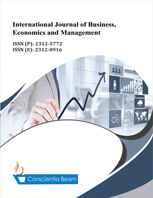Profit And Loss Sharing As an Offshoot for Bank Stability: A Comparative Analysis
DOI:
https://doi.org/10.18488/journal.62/2015.2.3/68.3.64.77Abstract
The global crisis in 2007 has revived interest in the Islamic banking and finance industry. The profit and loss sharing (mudaraba and musharaka) attributes of Islamic banking and finance have shielded Islamic banks from the impact of a crisis. In other words, the Islamic banking system is stable by virtue of the profit and loss sharing principle. The relative stability of the Islamic banking model can also be deduced from the fact that the Islamic banking and finance system is effectively under the control of the authority of the central bank, which is not easily influenced by non-policy factors. This study concludes that a case for the superiority of Islamic banking has been made for example in Tunisia and Iran, where separate Islamic or interest-free counters were opened in all branches of commercial banks along with traditional or westernised interest-based banks. The substitution of western interest-bearing deposits by profit and loss sharing deposits connotes to the stability of the Islamic finance and banking system. The Islamic profit and loss sharing system does have merit and deserves attention from academics and policy-makers alike, especially in view of the financial crises and rampant bank failures.

